 Petzlover
Petzlover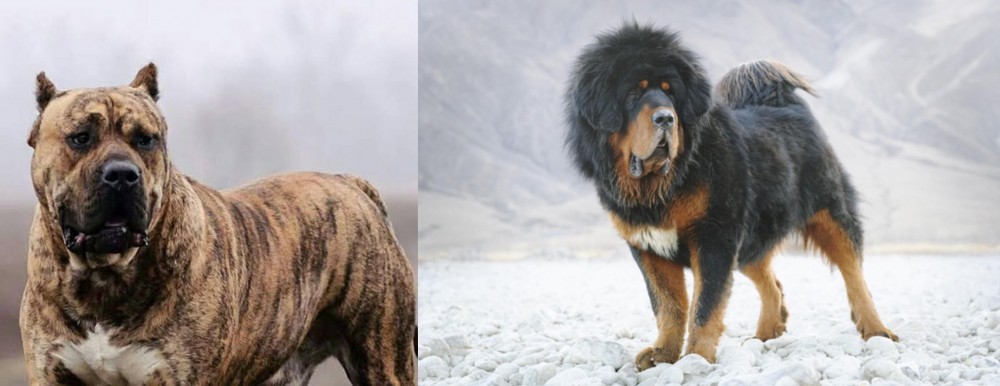 Perro de Presa Canario is originated from Spain but Tibetan Mastiff is originated from China. Perro de Presa Canario may grow 17 cm / 6 inches shorter than Tibetan Mastiff. Perro de Presa Canario may weigh 20 kg / 44 pounds lesser than Tibetan Mastiff. Both Perro de Presa Canario and Tibetan Mastiff has almost same life span. Perro de Presa Canario may have more litter size than Tibetan Mastiff. Perro de Presa Canario requires Low Maintenance. But Tibetan Mastiff requires Moderate Maintenance
Perro de Presa Canario is originated from Spain but Tibetan Mastiff is originated from China. Perro de Presa Canario may grow 17 cm / 6 inches shorter than Tibetan Mastiff. Perro de Presa Canario may weigh 20 kg / 44 pounds lesser than Tibetan Mastiff. Both Perro de Presa Canario and Tibetan Mastiff has almost same life span. Perro de Presa Canario may have more litter size than Tibetan Mastiff. Perro de Presa Canario requires Low Maintenance. But Tibetan Mastiff requires Moderate Maintenance
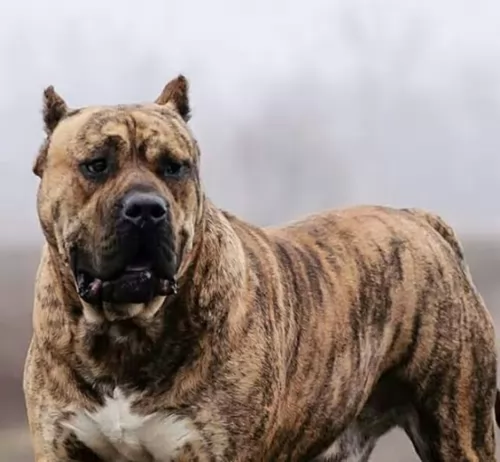 This large dog, also known as the Canary Mastiff, is a rare Molosser-type dog hailing from the Canary Islands.
This large dog, also known as the Canary Mastiff, is a rare Molosser-type dog hailing from the Canary Islands.
It does appear as if, according to records, that these dogs were also consumed at one time. The dog has also been used as a cattle dog as well as being used for dog fighting till the middle of the 1900s. Dog fighting was prohibited in the 1940s but it continued for a number of decades.
As people became interested in other dog breeds, the Presa nearly died out but some breeders revived the breed because of it having some good characteristics – territorial, brave, protective and intelligent. The FCI recognized the dog in 2011.
 The Tibetan Mastiff is still considered to be a primitive breed originating in Tibet centuries ago. The breed was developed to guard property and livestock. They still do this as well as being a much loved family dog and a show dog as well. There is very little history that is documented for the breed prior to the 19th century.
The Tibetan Mastiff is still considered to be a primitive breed originating in Tibet centuries ago. The breed was developed to guard property and livestock. They still do this as well as being a much loved family dog and a show dog as well. There is very little history that is documented for the breed prior to the 19th century.
Believed to be centuries old with ancestors who are mastiff like dogs that developed into two different types of Tibetan Mastiffs. These types are the Tsang-Khyi and the Do-Khyi. The Tsang Khyi were guardians for Tibetan monks, while the Tsang-Khyi guarded flocks for nomadic shepherds and in villages.
The first Tibetan Mastiff was imported in 1847 to England and presented as a gift to Wueen Victoria, from India’s Viceroy. By 1873 there was an English Kennel Club and the breed was labeled a large dog from Tibet and entered into the EKC Stud Book.
The next year the future King Edward VII, brought another two Tibetan Mastiffs to the United Kingdom to show in 1875. The first breed club began in 1931. The world wars interfered and no new dogs were imported to England until 1976. Two dogs were given to the President of the United States in the late 1950’sbut were not bred and it wasn’t until 1970 that any more were imported. The US Tibetan Mastiff Club was not founded until 1974 and they were first entered in a National Specialty show in 1979.
In 2007 the AKC recognized the breed as a working dog since 2007. It’s hard to find a purebred Tibetan Mastiff in Tibet anymore.
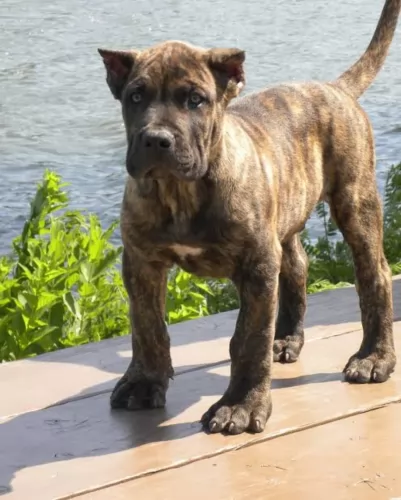 The Perro de Presa Canario or Canary Dog is large and muscular. He stands at 58 to 66cm in height and weighs anything from 40 – 70kg. He has a deep bark.
The Perro de Presa Canario or Canary Dog is large and muscular. He stands at 58 to 66cm in height and weighs anything from 40 – 70kg. He has a deep bark.
The head is broad and the ears are normally cropped to give him a more aggressive appearance. With ear cropping being banned the ears are close fitting to the head and are floppy. This is one of those dogs where the rear of the dog is slightly higher than the shoulders.
The coat is short and there is no undercoating. It is available in all different shades of fawn and brindle. The breed standard requires the dog having a black mask.
Canine experts tell us that this large working dog has got such fearless guardian characteristics that they wouldn’t recommend this dog for first time dog owners. On the other hand however, there are dog owners who claim that with good socialization, this dog becomes docile and amicable around their human family.
He is a clever dog so training and socialization will be easy and it will be worth it. This is a dog noted for its strength, it’s strong personality and potential for aggression, so training and socialization will be most important.
 Both types of Mastiffs can be present in the same litter, so that both larger and smaller pups are present. Both types are well-muscled and structured. Today’s dogs being developed in China and the West are much larger than the previous ones. These dogs would be less useful to the nomads and cost too much to feed. Today’s dog is very large with a large head and a long double coat. This coat can be black, brown, gold, and blue, with or without tan markings. There are now a few white Tibetan Mastiffs being bread.
Both types of Mastiffs can be present in the same litter, so that both larger and smaller pups are present. Both types are well-muscled and structured. Today’s dogs being developed in China and the West are much larger than the previous ones. These dogs would be less useful to the nomads and cost too much to feed. Today’s dog is very large with a large head and a long double coat. This coat can be black, brown, gold, and blue, with or without tan markings. There are now a few white Tibetan Mastiffs being bread.
The breed standard for the Mastiff is different in the West than in the East. In the East the breed is broken into two categories – the Lion Head and the Tiger head.
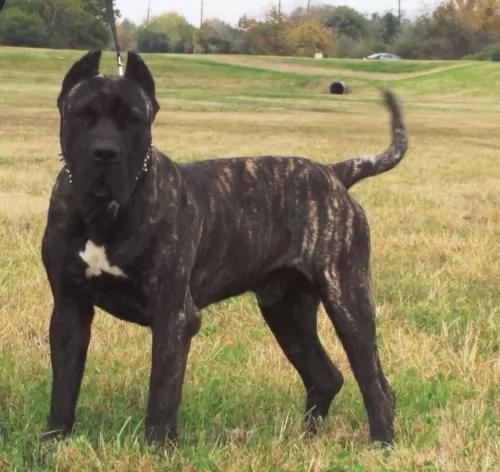 Contrary to what many people think, the Perro de Presa Canario can be a calm, gentle dog when trained and socialized properly.
Contrary to what many people think, the Perro de Presa Canario can be a calm, gentle dog when trained and socialized properly.
It is only when you bring an older, unknown dog into your midst that you would have to exercise caution with him as he can then be aggressive.
Dogs become dangerous and aggressive when they are brought up by aggressive, uncaring people. Humans are always to blame for the way a dog turns out. Provide this large dog with a loving, caring home, and he’ll show you what a remarkable pet he can be.
 The Perro de Presa Canario can live to be between 8 and 12 years of age. Being a large breed the dog can be susceptible to hip dysplasia and other problems such as cancer and heart problems. It is highly unlikely that a well cared for dog will get any of these illnesses.
The Perro de Presa Canario can live to be between 8 and 12 years of age. Being a large breed the dog can be susceptible to hip dysplasia and other problems such as cancer and heart problems. It is highly unlikely that a well cared for dog will get any of these illnesses.
It is far better to give your dog two smaller meals a day as opposed to one bigger meal as then he tends to wolf his food down. This can lead to bloat, where the stomach swells up and worse, it twists. This dangerous situation prevents fluid and air from escaping the stomach. Your dog is restless, he paces and salivates, wanting to vomit. Bloat can affect any dog at any age.
Kidney disease can develop because of some other illness or it can develop on its own. It can even be caused by bad teeth when bacteria enters the bloodstream of the dog.
 Though considered a primitive dog and isolated for several centuries, so they should not have as many genetic or inherited conditions as other dogs with more cross and in-breeding. These are the potential health issues they might develop:
Though considered a primitive dog and isolated for several centuries, so they should not have as many genetic or inherited conditions as other dogs with more cross and in-breeding. These are the potential health issues they might develop:
Elbow and Hip dysplasia – can lead to lameness and arthritis.
OCD Osteochondrois Dissecans – this is also an orthopedic condition when the soft tissue growth is abnormal in the joints. It is painful and the joint is stiff. Don’t breed a dog that has this condition.
Panosteitis – Canine growing pains. Inflammation of the long bones in large dogs as they grow. They will eventually out grow it. Pain can be managed through medication.
Autoimmune Hypothyroidism – Hormone deficiency leading to flaky skin, weight gain and lack of energy. Can be managed through medication.
Canine Inherited Demyelinative Neuropathy – If your Tibetan Mastiff is going to have this condition, they will have it by six weeks of age. Weakness in the hind legs leading to paralysis.
Bloat – deadly if not treated immediately and related to dietary habits.
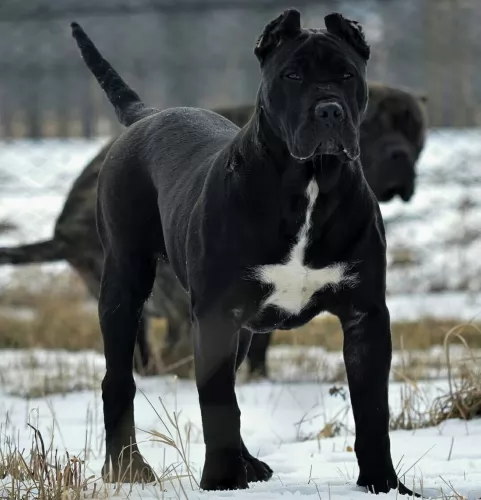 This is a short haired dog, and he isn't a heavy shedder so beyond regular twice-a-week brushing he will simply need to have his eyes and ears checked for infections.
This is a short haired dog, and he isn't a heavy shedder so beyond regular twice-a-week brushing he will simply need to have his eyes and ears checked for infections.
He will also need to have his nails clipped and to check his teeth over too. A sore, bad tooth at the back of your pet’s mouth can cause terrible pain but also play havoc with his general health.
Your Perro de Presa Canario is a high-energy dog and he will need daily exercise. He will love a good walk but he will also need something more strenuous and demanding such as ball- and rope tug-of-war games.
Try and provide your large pet with a top quality commercially manufactured food – one that is packed with vitamins and minerals instead of colorants preservatives and toxic fillers.
Break the monotony of feeding him only kibble by mixing in some cooked chicken, brown rice, sweet potato, carrots and spinach. Dogs love consistency and simplicity and simple meals like this with some raw meat thrown in occasionally will keep him healthy and happy. Never leave him without a constant supply of fresh, cool water.
 Don’t feed the puppy too much protein as you want to prevent Panosteitis and growing too quickly. Do not overfeed. Feed 4-5 cups of high quality large breed puppy food in 3-4 meals day.
Don’t feed the puppy too much protein as you want to prevent Panosteitis and growing too quickly. Do not overfeed. Feed 4-5 cups of high quality large breed puppy food in 3-4 meals day.
4 to 6 or more cups of a high-quality dog food daily, divided into two meals. To avoid bloat do not feed before or after vigorous exercise.
Calm and laid back when inside.
They need 20-30 minutes of vigorous exercise and play daily. They prefer to play with other large dogs.